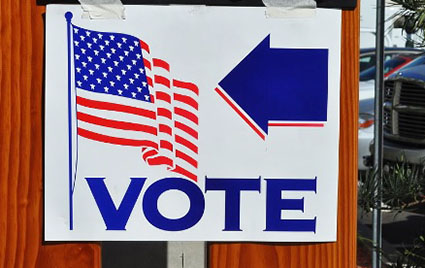by WorldTribune Staff / 247 Real News November 21, 2023
A federal court on Monday ruled that private plaintiffs do not have the ability to sue under Section 2 of the Voting Rights Act.
 Only the U.S. Attorney General can bring an action under Section 2 of the Voting Rights Act, the Eighth Circuit Court of Appeals ruled in what was seen as a major victory for election integrity advocates.
Only the U.S. Attorney General can bring an action under Section 2 of the Voting Rights Act, the Eighth Circuit Court of Appeals ruled in what was seen as a major victory for election integrity advocates.
Turning Point USA’s Charlie Kirk said the decision was a “devastating blow against the Left’s racket to make election integrity borderline illegal.”
Kirk noted: “For decades, random citizens have been allowed to sue state or local governments to throw out voter ID, signature verification, or other election practices that supposedly constitute “discrimination.” This law has encouraged well-funded groups to sue every government, however minor, that has any election security measures. Many jurisdictions fear passing any laws at all because they don’t want to deal with the legal costs and hassle.
“The Left has built a massive apparatus led by Marc Elias to outsource all its election lawsuits. Now, the 8th Circuit says this racket is illegal throughout its jurisdiction, which includes the swing states of Iowa and Minnesota.
“Marc Elias is fuming. He calls it the most dramatic change to election laws in half a century. His group, Democracy Docket, calls it ‘catastrophic.’ The tide is shifting. 2024 is not 2020. We can win — and the Left is starting to panic.”
Section 2 of the act prohibits states from enacting any voting standard, including maps, that would deny or limit any citizen’s right to vote based on their race or color.
In the 2-1 decision by a panel of the Eighth Circuit Court of Appeals based in St. Louis, the majority said other federal laws, including the 1964 Civil Rights Act, make it clear when private groups can sue but said similar wording is not found in the Voting Rights Act.
“When those details are missing, it is not our place to fill in the gaps, except when ‘text and structure’ require it,” Circuit Judge David R. Stras wrote for the majority in an opinion joined by Judge Raymond W. Gruender. Stras was nominated by President Donald Trump and Gruender by President George W. Bush.
The decision affirmed a lower court judge’s decision to dismiss a case brought by the Arkansas State Conference NAACP and the Arkansas Public Policy Panel after giving U.S. Attorney General Merrick Garland five days to join the lawsuit.
In their complaint, the plaintiffs said the reapportionment of Arkansas House of Representatives’ seats diluted the strength of Black voters. They sought a declaration from the U.S. District Court for the Eastern District of Arkansas that the redistricting plan violated Section 2 of the Voting Rights Act.
In his order dismissing the case in February 2022, U.S. District Judge Lee Rudofsky — also a Trump appointee — said there was a “strong merits case” that some of the voting districts the plaintiffs challenged were unlawful under Section 2, but that he was unable to decide on the merits, because Congress had not expressly provided a private right of action to enforce the law.
“After a thorough analysis of the text and structure of the Voting Rights Act, and a painstaking journey through relevant case law, the court has concluded that this case may be brought only by the attorney general of the United States,” Rudofsky wrote in his 42-page opinion, in which he gave the federal government five days to join the case as a plaintiff and continue the litigation before dismissal.
Publishers and Citizen Journalists: Start your Engines
